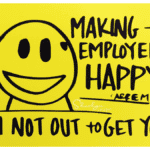I think we all understand the importance of corporate culture. But do we understand the purpose?
That was another big takeaway during the 2014 Great Place to Work conference. Culture must serve a purpose. And that purpose must translate into organizational success.
For example, if the organizational culture is fun…that’s great…but how does a fun culture translate into success for the business? Now, it’s possible the answer is: A fun culture allows the company to hire fun employees who will deliver a fun and engaging experience for our customers. Just because I used fun as the example doesn’t mean it’s not legit. The example is to demonstrate the connection between culture, values, purpose, and outcomes.
At W.L. Gore, they’ve found that building a culture of trust has created their business success. If you’re not familiar with the company, W.L. Gore and Associates is a privately held company with annual sales in excess of $3 billion. They take pride in being an innovator of technology-driven solutions.
As a company focused on innovation, they have built a culture that nurtures and supports innovative practices. One way they’ve done that is through their commitment in keeping the company “small”. While the organization in total is large, they have found that, when groups get too big, they become complex. And, for them, complexity stifles their innovation.
So the company intentionally divides itself into manageable parts. This minimizes bureaucracy and complexity. It allows more networking and collaboration. In Gore’s case, it allows them to achieve successful results.
Now I will admit, this might not work for every organization. That’s not the point. The goal shouldn’t be to duplicate another company’s culture. It’s to ask the question: Does our culture help us achieve our business goals?
It’s very easy to create a work environment and call it your culture. Fun features like bean bag conference room chairs and ping pong tables in the breakroom are not culture. When it comes to the signs of success, the methods you use to achieve it – that’s your culture.
Image courtesy of Sharlyn Lauby








Ben Slater says
Like the point about about keeping the company small despite the size of the organization. Corresponds nicely with what I’ve read about Dunbar’s rule – how 150 people is the optimum number for an organization. Nice piece – sharing now
Sharlyn Lauby says
Thanks Ben!
Paul Hebert says
This is a question I like to ask when we talk culture and employee engagement.
If the ROI on engagement was “zero” – in other words – no increase in business objectives would you do it?
To me engagement – or more accurately – creating an environment where people want to work should be something you do because it is the right thing to do. I don’t think you should go out of buisness doing it – but putting it in terms of “culture MUST have a business outcome” also creates the inverse – ONLY do culture if it creates a business outcome.
Does having a great culture help your business. It sure does. Does having a culture help people feel validated and therefore spread that feeling to others? Sure does.
Should companies ONLY worry about culture if it drives business objectives. Absolutely not.
We wonder why engagement scores don’t move much – it’s because employee have figured out that for many companies it is simply another way to get more output from the human machines and not really care about those machines outside of that production capacity.